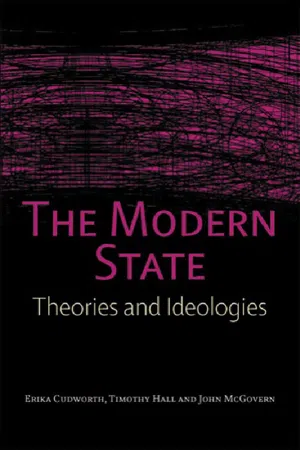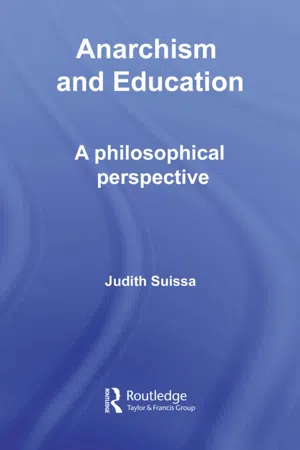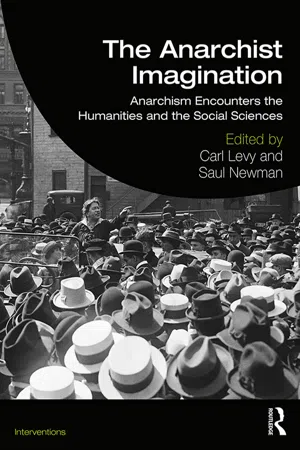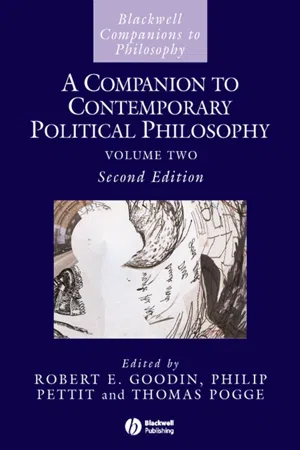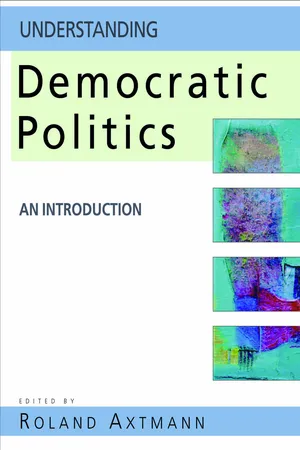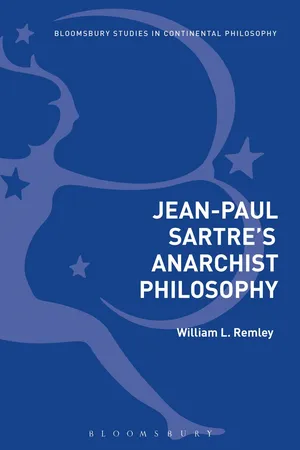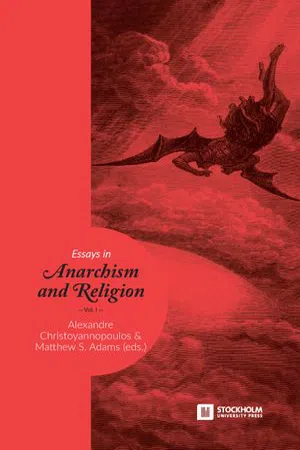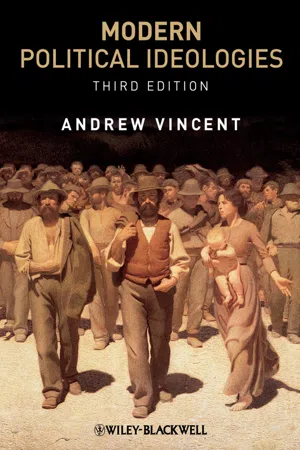Politics & International Relations
Anarchism
Anarchism is a political ideology that advocates for the abolition of hierarchical systems of power, such as the state and capitalism, in favor of voluntary cooperation and decentralized forms of organization. Anarchists seek to create a society based on principles of mutual aid, direct democracy, and individual freedom, often through non-violent means such as civil disobedience and grassroots activism.
Written by Perlego with AI-assistance
Related key terms
1 of 5
12 Key excerpts on "Anarchism"
- eBook - PDF
The Modern State
Theories and Ideologies
- Erika Cudworth, Timothy Hall, John McGovern(Authors)
- 2020(Publication Date)
- EUP(Publisher)
Anarchists generally agree that forms of political authority restrict individual actions and beliefs and constitute a violation of their freedom (Goodwin 1982: 110–12). In light of this, they endorse egalitarianism, volun-tary co-operation, self-management, individualism and decentral-isation (Goodway 1989: 2). Like many feminists, anarchists tend to define politics very broadly and their analysis of political power is not restricted to the ‘state’ and ‘government’ (see Chapter 9). This said, an antipathy towards institutionalised authority has meant that historically a key feature of Anarchism has been the contesta-tion of authority exercised by the state. While Anarchism emerged in eighteenth-century Europe in the context of political authoritar-ianism, it has remained staunchly critical of liberal intimations of ‘democracy’. Liberal or ‘bourgeois’ democracy with the represen-tative institutions of parliamentarianism is seen as inherently incap-able of providing anything more than a justification for oligarchy. There are a variety of different kinds of anarchist theorising and, almost inevitably, individual thinkers may slip across the lines drawn by a typology. All anarchists have provided some broader critique of social and economic structures and processes than simply a denunciation of the state. In the nineteenth century, most anarchists were also involved in workers’ political organisations and most contemporary anarchists subscribe to some form of ‘anarcho-communism’ (Miller 1984) or more commonly, ‘social Anarchism’, which is collectivist and in many ways, communitarian. In sharp contrast, ‘anarcho-capitalism’ (Miller 1984) or ‘individu-alist Anarchism’, exemplified by the work of Murray Rothbard Anarchism: the Politics of Anti-Statism 139 (1978), is an extreme form of liberalism based on the absolute sov-ereignty of the individual (also Nozick 1974: Part 1). - eBook - ePub
Anarchism and Education
A Philosophical Perspective
- Judith Suissa(Author)
- 2006(Publication Date)
- Routledge(Publisher)
1 Anarchism – definitions and questions
Before moving on to a discussion of the educational ideas associated with Anarchism, we need a broad understanding of what the anarchist position involves – and, perhaps equally importantly, what it does not involve.As a political ideology, Anarchism is notoriously difficult to define, leading many commentators to complain of its being ‘amorphous and full of paradoxes and contradictions’ (Miller 1984: 2).One reason for the confusion surrounding the use of the word ‘Anarchism’ is the derogatory meanings associated with the connected terms ‘anarchy’ and ‘anarchic’. The Oxford English Dictionary defines anarchy as (1) absence of government or control, resulting in lawlessness (2) disorder, confusion; and an anarchist as ‘a person who believes that government is undesirable and should be abolished’. In fact, the title ‘anarchist’ was first employed as a description of adherence to a particular ideology by Pierre-Joseph Proudhon in 1840 and, as shall transpire, the substantial part of this ideology consisted in far more than a simple rejection of government. Indeed, as many anarchists have stressed, it is not government as such that they find objectionable, but the hierarchical forms of government associated with the nation state.A second reason for the difficulty in reaching a conclusive definition is the fact that Anarchism – by its very nature – is anti-canonical, and therefore one cannot refer to any single body of written work (unlike in the case of Marxism) in the search for definitive answers to questions on the nature and principles of the anarchist position. Furthermore, those anarchists who have written extensively on the subject have seldom formulated their views in the form of systematic works – largely out of a conscious commitment to the popular propaganda of their ideas. - eBook - PDF
The Anarchist Imagination
Anarchism Encounters the Humanities and the Social Sciences
- Carl Levy, Saul Newman(Authors)
- 2019(Publication Date)
- Routledge(Publisher)
3 Contesting the state of nature Anarchism and International Relations 1 Zaheer Kazmi International Relations (IR) shares an intimate though unusual relationship to anar-chism. Anarchy is a foundational concept in IR yet Anarchism has been ignored almost entirely by IR scholars. IR also holds a unique position among the academic disciplines under discussion in this volume as, unlike them, much of the subject ’ s distinctiveness has derived from its pivotal focus on anarchy as the fundamental condition of international relations. 2 Moreover, its treatment of anarchy has been peculiar to the discipline, acting more as a ‘ state of nature ’ metaphor, which distinguishes the international from the domestic sphere, than a global moral vision. In IR theory, anarchy thus functions chie fl y as a descriptive category which denotes the absence above states of the overarching political authority which obtains within them, rather than a prescription about how the world should be ordered. It is perhaps no surprise, therefore, that the emergent sub-dis-cipline of international political theory, in its normative aspect, has been more receptive to activist anarchist scholarship than the traditional core of IR theory. 3 In light of the ambivalence of anarchy in IR, however, as both an analytic and normative category, exploring Anarchism in IR can also bring into view the deeper relationship between theory and ideology in academic inquiry. In IR, an anarchist way of seeing is not neces-sarily the same thing as seeing like an anarchist. Academic volumes on Anarchism are, almost without exception and despite the vitality of the debates they exhibit, platforms for advocating Anarchism by those sym-pathetic to it as an ideology or social movement. 4 This is not my aim in this chapter which, in this respect, lies outside the bounded discourse of what has come to be termed ‘ anarchist studies ’ . - eBook - PDF
- Nancy S. Love(Author)
- 2006(Publication Date)
- CQ Press(Publisher)
The latter refers to nonauthoritarian socialists who refuse to impose a proletarian dictatorship during the transition from capitalism to social-ism. These two anarchist “faces” are not necessarily mutually exclusive. When seen together, they suggest that Anarchism offers an alternative to liberal capitalism and to authoritarian socialism. A century after Proudhon, Heider anticipates a political future in which Anarchism will play a major role. Radical ecologists, animal rights activists, bohemians, neopagans, anarcho-feminists, anarcho-syndicalists, anarcho-capitalists, or libertarians are among the anarchist groups that are politically active today. 8 This diverse list establishes the continuing presence of Anarchism in con-temporary politics. Some scholars even suggest that Anarchism may guide interna-tional efforts to create a new post-state world order. 9 If so, it is time to clear up con-fusion about the meaning of Anarchism. We can begin with a comprehensive definition of the term that emphasizes anarchists’ common themes. According to John P. Clark, confusion about anar-chism arises because scholars neglect classical anarchist theory and historical anarchist practice. This leads to incomplete definitions that present Anarchism as merely destructive or, at best, utopian. Clark’s complete definition follows the 108 Anarchism linear approach to the study of an ideology’s structure we discussed in chapter 1 and includes these four components: 1. a view of an ideal, noncoercive, nonauthoritarian society; 2. a criticism of existing society and its institutions based on this antiau-thoritarian ideal; 3. a view of human nature that justifies the hope for significant progress toward the ideal; and 4. a strategy for change, involving immediate institution of noncoercive, nonauthoritarian, and decentralist alternatives. 10 Before turning to classical Anarchism and anarchist practice, we explore these four aspects of anarchist ideology in more detail. - Robert E. Goodin, Philip Pettit, Thomas W. Pogge, Robert E. Goodin, Philip Pettit, Thomas W. Pogge(Authors)
- 2009(Publication Date)
- Wiley-Blackwell(Publisher)
Originally, ‘the word “anarchist” . . . was used pejoratively to indicate one who denies all law and wishes to promote chaos. It was used in this sense against the Levellers during the English Civil War and during the French Revolution by most parties in criticizing those who stood to the left of them along the political spectrum’ (Woodcock, 1962, p. 111). It was first prominently used in an approbatory way in Proudhon’s What is Property? (1840), where he describes himself ‘as an anarchist because he believed that political organization based on authority should be replaced by social and economic organisa-tion based on voluntary contractual agreement’ (Woodcock, 1962, p. 111; cf. Lehning, 1968, p. 71). Since then there have been waves of anarchistic output of varying strength, most recently in the late 1960s. richard sylvan with robert sparrow 258 Explication Philosophically, Anarchism is the theory, principles or practice of anarchy. It refers, according to the dictionaries, to the ‘lack of coercive government’, the ‘absence of a political state’, the ‘want of authoritarian political heads or leaders, institutions or organizations’. In its normal political form, the term is applied to societies or communi-ties, territories or countries. Politically, there are three key structural components: authority, coercion and, normally comprehending both, the state. The notion has recently been extended beyond political arrangements to apply to other institutional forms, such as the church, science and law, to mean alternative forms lacking author-itarian structure and coercive methods. Thus appear such varieties as epistemological Anarchism and philosophical Anarchism. Although it is political Anarchism upon which this essay focuses, those other far-reaching analogies should not be lost sight of. They matter. Anarchism is to political authority as atheism is to religious authority, and rather as scepticism is to scientific authority.- Z. Kazmi(Author)
- 2012(Publication Date)
- Palgrave Macmillan(Publisher)
1 I argue that the neglect of the domestic analogy on the rare occasions anarchist ideas have entered into IR in favor of the dominant, heavily normative, approach common to their wider treatment in political thought sets limits on the contribution Anarchism stands to make to the more traditional concerns of state-centric international theory. To exemplify this and orient the rest of the study toward this approach to anarchist ideas in IR, the chapter closes with a short Revisiting Anarchism ● 19 illustration of what I have termed an “anarchical social contract” in aspects of the thought of Pierre-Joseph Proudhon and its relevance to theorizing the anarchistic and contractarian bases of interstate relations. The Anarchists The origins of Anarchism have been traced back to antiquity and beyond by those who regard it as a tradition of social and political thought with a distinct, if varied, intellectual lineage. 2 The etymology of the term, anarchy, originates in the Greek word (in its Latin form) ( anarchia), meaning “with- out a leader” and understood more commonly as the condition of being “without a ruler.” From an anthropological perspective, however, acephalous societies stretch back much further in time and today have also been the subject of various studies of actually existing primitive anarchic communi- ties. M. Fortes and E. E Evans-Pritchard’s study of primitive stateless soci- eties in Africa, for example, has pointed to the impressive degree of social solidarity that exists in such communities.- eBook - PDF
Understanding Democratic Politics
An Introduction
- Roland Axtmann(Author)
- 2003(Publication Date)
- SAGE Publications Ltd(Publisher)
26 Anarchism and Democracy Patricia Clark and Sharif Gemie WHAT IS Anarchism? For most of human history people have lived without the state. Indeed, the modern nation-state is a comparatively recent invention, born with the emergence of capitalism. Lib-eral democracy is one reaction to these evolu-tions; Anarchism, developing at about the same time as liberalism, is a second, radically different reaction. Anarchists make a distinction between society and the state. Society is natural: peo-ple are social beings and habitually live in communities. Anarchists see the state, how-ever, as an oppressive entity which is set up over society and which usurps functions that properly belong to autonomous communities and individuals. Rather than allowing people to flourish and develop their own ways of meeting challenges and fulfilling needs, the state is coercive and asserts its monopoly over law-making and government, punishing those who refuse its dictates and condition-ing citizens into quiescence and obedience. Therefore, anarchists want to abolish the state and replace it with autonomous, small-scale communities which empower and liberate citizens, so that their cooperative and creative faculties flourish in a non-hierarchical setting. While anarchists have been less successful than Marxists in developing their political philosophies, their various initiatives and campaigns have been sustained by common political cultures and political ideals. These have certainly varied in their applications from century to century and country to coun-try, but there remains an irreducible core of anarchist practice that marks it out from other political movements. At the heart of Anarchism is a deep commitment to a full, demanding interpretation of democratic prac-tice. Indeed, it is perhaps this combination of insurrectionary zeal and democratic practice which has made Anarchism so difficult for academic political philosophers to categorize and therefore so tempting to ignore. - eBook - PDF
- Jules Pretty, Andy Ball, Ted Benton, Julia Guivant, David R Lee, David Orr, Max Pfeffer, Professor Hugh Ward, Jules Pretty, Andy Ball, Ted Benton, Julia Guivant, David R Lee, David Orr, Max Pfeffer, Professor Hugh Ward(Authors)
- 2007(Publication Date)
- SAGE Publications Ltd(Publisher)
It offers political philosophies which argue for the transcendence of such struc-tures and suggest alternative social, political, economic and technological forms that would maximize the realm of freedom, autonomy and self-management. There are, however, tensions and differences within the anti-authoritarian tradition. Tensions exist between communitarians and individualists; between those that view social solidarity as a precondition for the free society (social anar-chists) and those who argue that primacy should be given to individual sovereignty and private judgement (anarcho-individualists). The tradition is also marked by notable tensions between scien-tific rationalists and romantics; between those that see capitalism as antithetical to a free society and those who view markets as the most efficient coordinating mechanism for decentralized societies. Additional differences emerge from the fact that anti-authoritarians who self-identify as ‘anarchists’ tend to hold to the view that the free society must necessarily be stateless. In contrast, self-identified ‘libertarians’ are more likely to tolerate minimal state forms for the foreseeable future or pragmati-cally aspiring, like Buber, to ‘substitute society for the State to the greatest degree possible’ (Buber, 1947, p. 80). Nevertheless, despite these differences Anarchism, LIBERTARIANISM AND ENVIRONMENTALISM 51 it is a shared hostility towards the ‘specific form of government which emerged in post-renaissance Europe’ (Miller, 1984, p. 5), that is, the modern state, that brings together libertarians and anar-chists of assorted persuasions. Anarchism, SOCIAL ORDER AND FREEDOM The words ‘law’ and ‘order’ are often paired as if they were indissolubly united. According to the modern mind there is no ‘order’ without ‘law’, where ‘law’ is understood as a body of rules devised and imposed from without. This law is enforced by the authority of the courts, the police, the army and ultimately, the government. - eBook - PDF
- William L. Remley(Author)
- 2018(Publication Date)
- Bloomsbury Academic(Publisher)
Included within this movement is the decentralization of political authority, worker self-management, freedom of expression, sexual freedom, decentralized economic structures, cooperatives, free education, neighbourhood government and the elimination of arbitrary distinctions based on age, sex or race, to name just a few. Overall, Clark sees his approach clearing up erroneous views of Anarchism reducing its thought to a simplistic, uncritical demand for the immediate abolition of government. While many anarchists do desire the end of government as we now know it, their demand does not include the abolition of the nation-state, but rather a decentralized system in which federation from below increasingly displaces centralized authority from above. Again, the guiding principle applicable to historical conditions is the abolition of coercive and authoritarian institutions and their replacement with voluntary and libertarian ones. Clark’s approach to Anarchism is, I think, a reasonable summary of the various components that comprise its ideology; there are some, however, who think it overly restrictive. Since it seems to revolve around the necessity of a ‘coherent’ political philosophy, Alan Carter argues that one can be an anarchist without resort to a coherent position, although he sees Anarchism as a coherent political philosophy. 39 Others, such as Paul McLaughlin, complain that Clark’s undertaking is rather cumbersome. In one 20 Jean-Paul Sartre’s Anarchist Philosophy particular aspect, the emphasis on and necessity of anarchistic praxis, McLaughlin seems quite critical of Clark. McLaughlin argues that Clark overstates the importance of praxis by requiring anarchists to be some kind of ‘activist’. 40 In other words, a Marxist intellectual is still a Marxist even if she has never been an activist. While this is true of Marxists, it is equally true of anarchists. Yet, in both instances, unless one acts, the theoretical never joins with the practical to induce change. - (Author)
- 2017(Publication Date)
- Stockholm University Press(Publisher)
Routledge Handbook of Religion and Politics (London: Routledge, 2009); Luca Mavelli and Fabio Petito, “The Postsecular in International Relations: An Overview,” Review of International Studies 38, no. 5 (2012). For anarchist studies, see for instance: Uri Gordon, Anarchy Alive!: Anti-Authoritarian Politics from Practice to Theory (London: Pluto, 2008); Nathan J. Jun and Shane Wahl, eds., New Perspectives on Anarchism (Lanham, MD: Lexington, 2009); Ruth Kinna, ed. The Continuum Companion to Anarchism (London: Continuum, 2012); Carl Levy and Saul Newman, eds., The Anarchist Imagination: Anarchism Encounters the Humanities and Social Sciences (Routledge, forthcoming); Jonathan Purkis and James Bowen, eds., Twenty-First Century Anarchism: Unorthodox Ideas for a New Millennium (London: Continuum, 1997); Jonathan Purkis and James Bowen, eds., Changing Anarchism: Anarchist Theory and Practice in a Global Age (Manchester: Manchester University Press, 2004); Duane Rousselle and Süreyyya Evren, eds., Post-Anarchism: A Reader (London: Pluto, 2011). 2. For instance: Alexandre Christoyannopoulos, ed. Religious Anarchism: New Perspectives (Newcastle upon Tyne: Cambridge Scholars Publishing, 2009); Alexandre Christoyannopoulos, Christian Anarchism: A Political Commentary on the Gospel (Exeter: Imprint Academic, 2010); Alexandre Christoyannopoulos, “Religious Studies and Anarchism,” in The Anarchist Imagination: Anarchism Encounters the Humanities and the Social Sciences , ed. Carl Levy and Saul Newman (tbc: Routledge, forthcoming); John A. Rapp, Daoism and Anarchism: Critiques of State Autonomy in Ancient and Modern China , Contemporary Anarchist Studies (London: Continuum, 2012); Mark Van Steenwyk, That Holy Anarchist: Refections on Christianity and Anarchism (Minneapolis: Missio Dei, 2012); 12 Essays in Anarchism and Religion: Volume 1 A. Terrance Wiley, Angelic Troublemakers: Religion and Anarchism in America , ed.- eBook - PDF
- Andrew Vincent(Author)
- 2009(Publication Date)
- Wiley-Blackwell(Publisher)
One consequence of this, particularly in more rural societies, was a clash between industrial and agri-cultural ways of life. It was not by accident that Anarchism had, until the 1930s, its most vigorous support in the more rural, peasant-based societies of India, Russia, Spain and Italy. The above social development coincided with a powerful European revolutionary tradition. Certain dates in this tradition became part of the iconography of socialism and Anarchism, each with its accompanying hagiograhy and provoking violent dis-agreement as to its true meaning. The European revolutions of 1789, 1830, 1848, 1871, 1917 and 1930 were seen as a developmental sequence imbued with a sacred teleology of liberation. This iconography was given its imprimatur and propagan-dized in the great debates of the First, Second and Third Internationals from the 1860s onwards. The anarchists saw themselves as part of this process of liberation. In many cases their opposition to the state and to wide-scale industrialism took its cue from an opposition to Marxism, which it saw as betraying the task of liberation and selling out to a form of state capitalism. The Nature of Anarchism Anarchism, like socialism, is subject to a great deal of critical contestation. Most commentators, and many anarchists themselves, recognize a diversity of view. This is 116 Anarchism to be expected in one sense, given the strong belief in liberty of opinion implicit within much anarchist argument. Also, like most ideologies, there are a number of ways in which the movement can be categorized. We can either classify Anarchisms according to the particular ideas and goals promulgated, or by the particular tactics employed, that is, pacifist or violent (see Friedrich 1972). This particular fraught debate has carried through into recent debates on anti-capitalist and anti-globalization strategies in the the 2000s (Day 2005). There is, in addition, considerable disagreement as to the number of schools of anar-chy. - eBook - PDF
Making Sense of Anarchism
Errico Malatesta’s Experiments with Revolution, 1889-1900
- Davide Turcato(Author)
- 2012(Publication Date)
- Palgrave Macmillan(Publisher)
1 Introduction: Anarchism, a Simple and Odd Business? What strikes the ordinary observer of Anarchism is the gap between its naïve, simple ideal and the hard, complex reality. Anarchists seem to miss some obvious point about the way people are or to make unwarranted assump- tions about the way people can be. Indeed the oddity of Anarchism seems to be plain to see. To increase the observer’s puzzlement, the obviousness of the anarchists’ cognitive shortcomings is only proportional to their obduracy in neglecting them. This makes understanding anarchists a difficult task. It is a postulate of interpretive sociology of Weberian derivation that an action can be under- stood in terms of its reasons: ‘observers understand the action of an observed subject as soon as they can conclude that in the same situation it is quite probable that they too would act in the same way’ (Boudon, Theories, 31). In this respect, Anarchism looks like a sociological puzzle. The kind of empa- thy required to understand it seems to be out of reach. Based on the social science common definition of rationality as coherence between desires, beliefs, and behavior (Martin and McIntyre, 283), Anarchism seems to imply an element of irrationality. Historiography and the irrationality of Anarchism This common-sense perception is largely shared by the historiography of Anarchism, which tends to regard this movement as inherently flawed. Con- sequently, much of this historiography can be synthesized in one claim: anarchists were losers and necessarily so. Anarchism is described in turn as a dead, dying, or doomed ideology, depending on one’s chronological scope, and the historian’s task becomes to explain why it could not be otherwise. Marxist historiography has followed a pattern established by Marx him- self, who branded Anarchism a form of sectarianism typical of early stages of the proletariat’s development.
Index pages curate the most relevant extracts from our library of academic textbooks. They’ve been created using an in-house natural language model (NLM), each adding context and meaning to key research topics.
